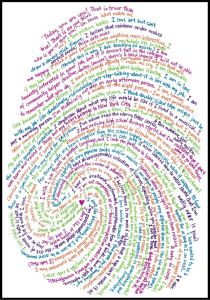Our linguistic fingerprint
Medical Pharmaceutical Translations • Oct 5, 2015 12:00:00 AM

Words are all around us – we speak them, we read them, hear them, even translate them. But did you know they’re also an integral part of who we are?
The words you use become a sort of linguistic fingerprint. That’s not me getting poetic; there’s an entire field devoted to it – forensic linguistics. Forensic linguists examine documents to establish who actually wrote them – and that can imply a lot more than you might imagine.
While the linguists themselves used to carefully read through and gather evidence from documents, things have gotten simpler over time. Now, as this article explains, they use software programs like JGAAP, developed by Duquesne University professor Patrick Juola and his team, or Signature, created by Oxford University’s Patrick Millican. By studying phenomena like recurring words or phrases, these programs can help resolve authorship mysteries.
For example, when Juola was asked to investigate an anonymous tip that novel The Cuckoo’s Calling by Robert Galbraith was actually the work of J.K. Rowling, he scanned it, along with several books by other authors and one confirmed Rowling tome. His software performed a number of tests, including listing the 100 most commonly occurring words in each book. When Juola’s team removed plot-specific terms, there was little doubt: of all the authors, Rowling’s vocabulary usage was most similar to the author of The Cuckoo’s Calling. Using the same reasoning, but with a list of the 500 most common words, Millican came to the same conclusion.
Still, a writer could consciously try to alter their vocabulary choices. Another more difficult thing would be to completely change how they use articles and other basic words, or how they pair words together. Testing these, JPAAG found that the Cuckoo’s author and Rowling were once again uncannily similar. While it seems linguistic forensics results are never 100% positive (Juola remarks that you could possibly have two people who just write in a very similar way), they often result in very likely conclusions. That was the case this time — a few days later, Rowling admitted she was indeed the book’s real author.
Forensic linguistics isn’t just used for sensational cases of proving authorship. As Juola shares, he and his colleagues can even be valuable witnesses in legal cases. He discusses one case involving a man who’d written anonymous articles critical of his native country’s government. Juola was able to prove he was actually the articles’ author, preventing him from being deported and facing his country’s secret police.
Our word choice and usage isn’t the only way language imprints itself on us. A recent study has revealed that people who were exposed to a language as babies, but never got a chance to learn or speak it in depth — in this case, people born in China who were adopted by French Canadian families as babies — still have a special reaction to the sounds of that language. When a recording of Mandarin sounds was played for different groups, bilingual Mandarin speakers’ brains responded to the sounds – and so, it turns out, did the brains of adopted children who had only heard Mandarin spoken in the earliest days of their lives.
The study is so new that no follow-up research has been done yet. It definitely gives rise to a lot of questions, among them, would learning a language be easier for someone who heard it as a baby?
Whatever future research shows, one thing is clear – our relationship to language goes far deeper than many of us may have realized.
